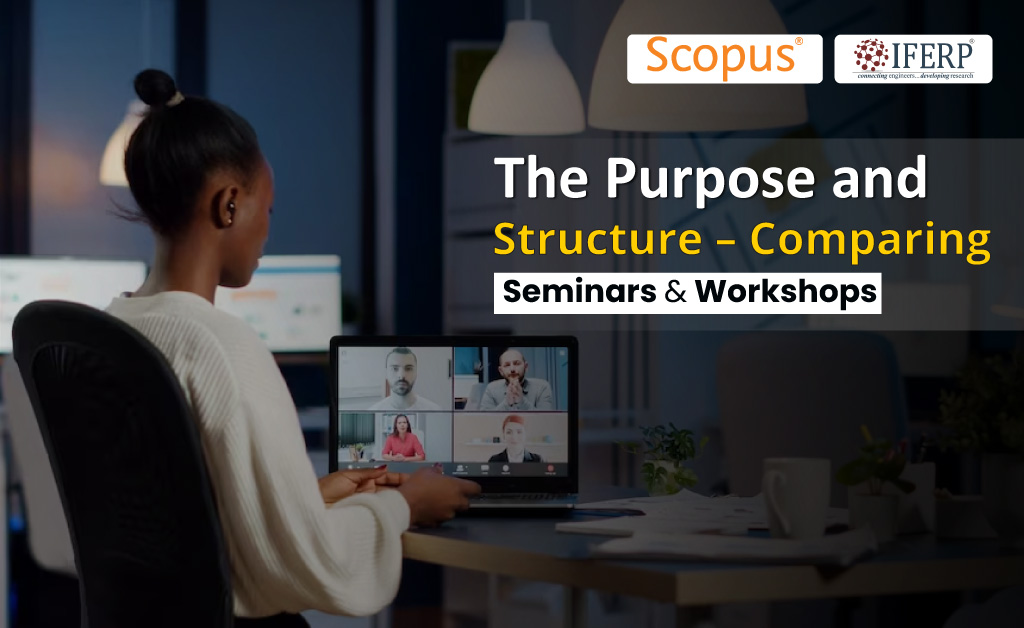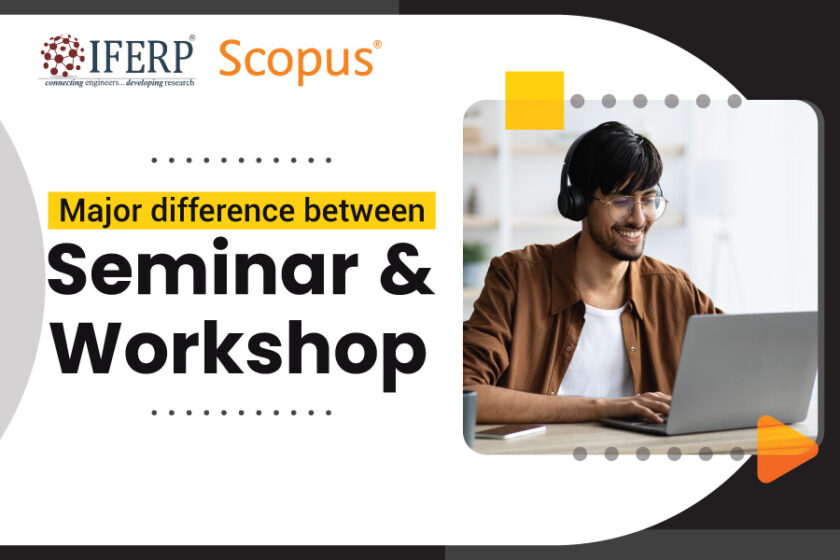Understanding Seminars and Workshops: An Introductory Overview
One of the crucial aspects of professional and academic growth lies in the continuous learning and sharing of knowledge. Seminars and workshops are two such platforms that facilitate this process. However, while both of these terms are often used interchangeably, they represent different methods of learning and knowledge sharing. Explored below are the definitions, objectives, and differences between seminars and workshops.
Defining Seminars and Workshops
To understand the differences, it is essential first to define what seminars and workshops are.
- Seminars
A seminar typically refers to a formal gathering where a subject matter expert delivers a presentation on a specific topic to an audience. The focus of a seminar is primarily on delivering information, and it often features a lecture-style format. The audience in a seminar (or at any international conference 2023) is usually passive, primarily listening and taking notes, with some opportunities for asking questions or engaging in brief discussions.
- Workshops
On the other hand, workshops are more interactive and hands-on. They involve a smaller group of people and are designed to teach or develop a particular skill. In a workshop, the facilitator usually has a plan but also adapts according to the group’s progress. The participants are actively involved in practicing the skills being taught, and there is a heavy emphasis on group activities and participant interaction.
- The Goals & Objectives
The primary objective of a seminar is to impart knowledge on a specific topic. Seminars are generally organized to raise awareness or share new research findings.
Conversely, workshops are designed with the intention of skills development. They aim to give the participants a practical understanding of a specific skill set, enabling them to implement what they’ve learned in their professional or personal lives.
- The Distinction In Structure & Format
The structure and format of seminars and workshops further highlight their differences. Seminars typically involve one or more speakers delivering a talk to a larger audience. The attendees primarily listen, with occasional opportunities for Q&A sessions.
On the other hand, workshops follow a more flexible format, and they encourage active participation. The facilitator introduces concepts and then directs participants to practice these through exercises, group tasks, or discussions.
- Differentiating The Role Of The Facilitator
In seminars, the facilitator, who is often an expert in the field, provides the attendees with in-depth knowledge about a specific topic. The facilitator’s role is predominantly to deliver information and answer any questions from the attendees.
On the contrary, in workshops, the facilitator guides the participants through a learning process. The facilitator is more of a coach, assisting participants in gaining a new skill or honing an existing one.
While both seminars and workshops (along with any meticulously developed skill development programme) are crucial for learning and development, their differences make them suitable for different scenarios. A clear understanding of these can help individuals and organizations choose the right format depending on the learning outcomes they aim to achieve.
- Major #1
Materials & Tools Used In Seminars & Workshops
- Seminars and workshops, both pivotal for personal and professional development, often use different materials and tools to facilitate learning.
- This section explores the specific materials and tools utilized in these events and how they contribute to the different learning experiences.
- Unique Elements Of Seminars
- A seminar entails academic instruction, either at an academic institution or extended by a commercial entity or professional organization.
- It has the function of uniting small groups for recurring events, concentrating each time on some specific subject, in which everyone present is invited to participate.
- Presentation Materials
- In seminars (or as one can witness at any upcoming educational conference 2023, for that matter), the key materials are those required for presentation.
- This may include slide presentations, handouts, and sometimes video or audio materials.
- The presenter often uses a projector and a screen to display information to the audience visually.
Notes and Reference Materials
As seminars involve a lot of listening and less interaction, attendees often come equipped with note-taking materials.
These might be traditional pen and paper or digital devices like laptops or tablets.
The presenter may also share additional reading or reference materials for further learning post-seminar.
- Core Tools Of Workshops
- A workshop, in contrast to a seminar, is a more informal, interactive gathering where attendees are actively involved.
- Workshops are designed for smaller groups, and they aim to train or guide attendees to learn or practice a new skill.
- Hands-On Tools
- Workshops often require more varied and hands-on materials.
- For instance, if it’s a writing workshop, there might be writing prompts, sample texts, and peer review forms.
- A coding workshop might have computers, coding software, and problem sets.
- Essentially, the tools and materials would vary depending on the workshop’s goal.
- Interactive Materials
- Workshops may also utilize tools that facilitate group activities or discussions.
- This could be sticky notes for brainstorming sessions, whiteboards for group problem-solving, or even props and physical items for role-playing exercises.
- Instructional Guides
- Workshops may also provide instructional guides or manuals, especially if it’s a complex skill or process being taught.
- Attendees can use these guides during the workshop and also for post-workshop practice.
- The materials and tools used in seminars and workshops reflect their core differences.
- Seminars are typically presentation-driven and require tools that facilitate this delivery of information.
- Workshops, on the other hand, prioritize active learning and interaction, requiring materials that encourage participation and hands-on learning.
- Major #2
The Purpose and Structure – Comparing Seminars & Workshops
- When considering professional development opportunities, it’s important to understand the unique attributes of various formats.
- This section compares the purpose and structure of seminars and workshops, two common formats used in academic, professional, and community settings.
- Understanding Seminars
- Seminars are traditionally seen as a formal gathering of people where knowledge on a particular topic is shared.
- They typically involve an expert or a group of experts delivering information to participants.
- Purpose of Seminars
- Seminars aim to disseminate information or teach about a specific subject.
- These events are led by one or more experts who share their knowledge and research findings.
- Seminars can introduce new concepts, explore an existing topic in-depth, or present innovative research findings.

- Structure of Seminars
- Seminars usually follow a lecture-like structure with a strong focus on the presenter.
- The presenter shares their knowledge, often using tools such as PowerPoint presentations, videos, or handouts to assist their delivery.
- Seminars often end with a question and answer session, allowing attendees to clarify any points or delve deeper into particular areas.
- Examining Workshops
- Workshops, on the other hand, are typically smaller and more interactive than seminars.
- They encourage participants to engage directly with the material, often through practical exercises and group work.
- Purpose of Workshops
- The main goal of a workshop is skill development.
- Workshops provide an opportunity for participants to learn by doing, often in a hands-on manner.
- These events are beneficial for teaching practical skills, facilitating problem-solving exercises, or conducting training sessions.
- Structure of Workshops
- Unlike seminars, workshops tend to be less formal and more interactive.
- They usually start with a brief introduction of the topic by the facilitator, followed by exercises, group activities, or case studies that engage participants in active learning.
- There may be multiple sessions or rotations within a workshop, allowing for various activities or learning techniques.
- Choosing the Right Format
- The structure and purpose of seminars and workshops differ significantly, making each suitable for different learning objectives.
- If the goal is to gain a deep understanding of a specific subject from an expert, a seminar may be the appropriate choice.
- However, if the aim is to develop a particular skill or engage in hands-on learning, a workshop could provide a more effective learning environment.
- Understanding these differences can help individuals and organizations select the most effective format for their specific learning needs.
- Further, facilitators can use this knowledge to design events that effectively meet the desired learning outcomes.
- Future articles will delve into other aspects of seminars and workshops (as well as also successfully publishing in Scopus indexed journals), such as their typical duration, ideal environments, and evaluation methods.
- Major #3
Participant Interaction At Both Seminars & Workshops
- Professional development, academic learning, and skills training often involve different types of learning environments.
- Among the various formats available, seminars and workshops stand out due to their distinctive characteristics.
- This section delves into how participant interaction varies between these two formats, providing insights that can guide the selection of the most appropriate setting for specific learning goals.
- Participant Interaction In Seminars
- Seminars often involve one or more experts sharing information with an audience.
- They typically consist of lectures or presentations followed by a question-and-answer session.
- Listening More Than Speaking
- In a seminar, the majority of interaction is usually one-directional, from the speaker to the audience.
- Participants primarily play a passive role, listening and absorbing information.
- While there may be opportunities for questions or brief discussions, these typically occur towards the end of the session.
- Limited Group Interaction
- In most cases, seminars do not provide significant opportunities for participants to interact with each other (this is not so at international conferences, as you may notice on attending a high-level engineering conference 2023).
- The focus is on the relationship between the expert speaker and the audience.
- Some seminars may incorporate breakout sessions for small group discussions, but these are not a standard feature.

- Participant Interaction In Workshops
- In contrast to seminars, workshops are often more engaging and interactive.
- They provide ample opportunities for participants to practice new skills, work together, and discuss ideas.
- Active Engagement
- Workshops encourage active engagement from all participants.
- This could include hands-on activities, group discussions, or role-play exercises.
- The facilitator often plays a less prominent role, guiding activities and offering feedback rather than delivering lengthy presentations.
- Collaborative Learning
- Workshops tend to foster a collaborative learning environment.
- Participants have the opportunity to interact with each other, share experiences, and learn from each other.
- This can lead to a deeper comprehension of the topic and the development of practical skills (as well as also opportunities to have one’s work published in Scopus journals publication on occasion).
- Selecting The Right Learning Environment
- The level of participant interaction can significantly impact the learning experience and outcomes.
- If the primary goal is to receive information from an expert in the field, a seminar may be the most suitable choice.
- However, if the goal is to actively engage with the topic, practice new skills, and learn collaboratively, a workshop would likely provide a more beneficial learning environment.
- Understanding the differences in participant interaction between seminars and workshops can guide individuals and organizations in selecting the most appropriate format for their learning objectives.
- Moreover, it can help facilitators design more effective seminars or workshops that cater to the specific needs and expectations of their participants.


